An Investigation: CSR and Stakeholder Management in UK Fashion Retail
VerifiedAdded on 2023/01/07
|12
|4697
|83
Report
AI Summary
This research proposal investigates the role of Corporate Social Responsibility (CSR) and stakeholder management within the UK fashion retail sector. It begins by defining CSR and its importance, particularly in the fashion industry, where ethical and environmental concerns are paramount. The proposal outlines the academic significance of the topic and the growing consumer demand for sustainable practices, which influences brand loyalty. The aim is to analyze communication channels used by organizations and the impact of their CSR initiatives on stakeholders, addressing research questions regarding the alignment of company and stakeholder views, the effectiveness of different company sizes in CSR, and innovative CSR practices. A literature review explores the significance of CSR, stakeholder management policies, and company size/innovation, drawing on various academic sources. The research will use Maslow's hierarchy of needs and Utilitarianism concepts, and data from Mintel and Emerald. The project is justified by its relevance to understanding CSR's role and stakeholder management in the UK fashion retail sector, which is essential for businesses. The research is critical to understanding how businesses can navigate the complexities of CSR and stakeholder management in the UK fashion retail sector, considering the significance of consumer awareness of social and environmental issues.

Business and
Management
Management
Paraphrase This Document
Need a fresh take? Get an instant paraphrase of this document with our AI Paraphraser

TABLE OF CONTENTS
RESEARCH PROPOSAL............................................................................................................................................3
(A) INTRODUCTION..................................................................................................................................................3
Aim of the project.......................................................................................................................................................4
Research Objectives and Questions.............................................................................................................................4
(B) LITERATURE REVIEW.......................................................................................................................................4
(C) JUSTIFICATION AND CONTEXTUALIZATION............................................................................................7
(D) METHODOLOGY.................................................................................................................................................8
REFERENCES............................................................................................................................................................10
RESEARCH PROPOSAL............................................................................................................................................3
(A) INTRODUCTION..................................................................................................................................................3
Aim of the project.......................................................................................................................................................4
Research Objectives and Questions.............................................................................................................................4
(B) LITERATURE REVIEW.......................................................................................................................................4
(C) JUSTIFICATION AND CONTEXTUALIZATION............................................................................................7
(D) METHODOLOGY.................................................................................................................................................8
REFERENCES............................................................................................................................................................10
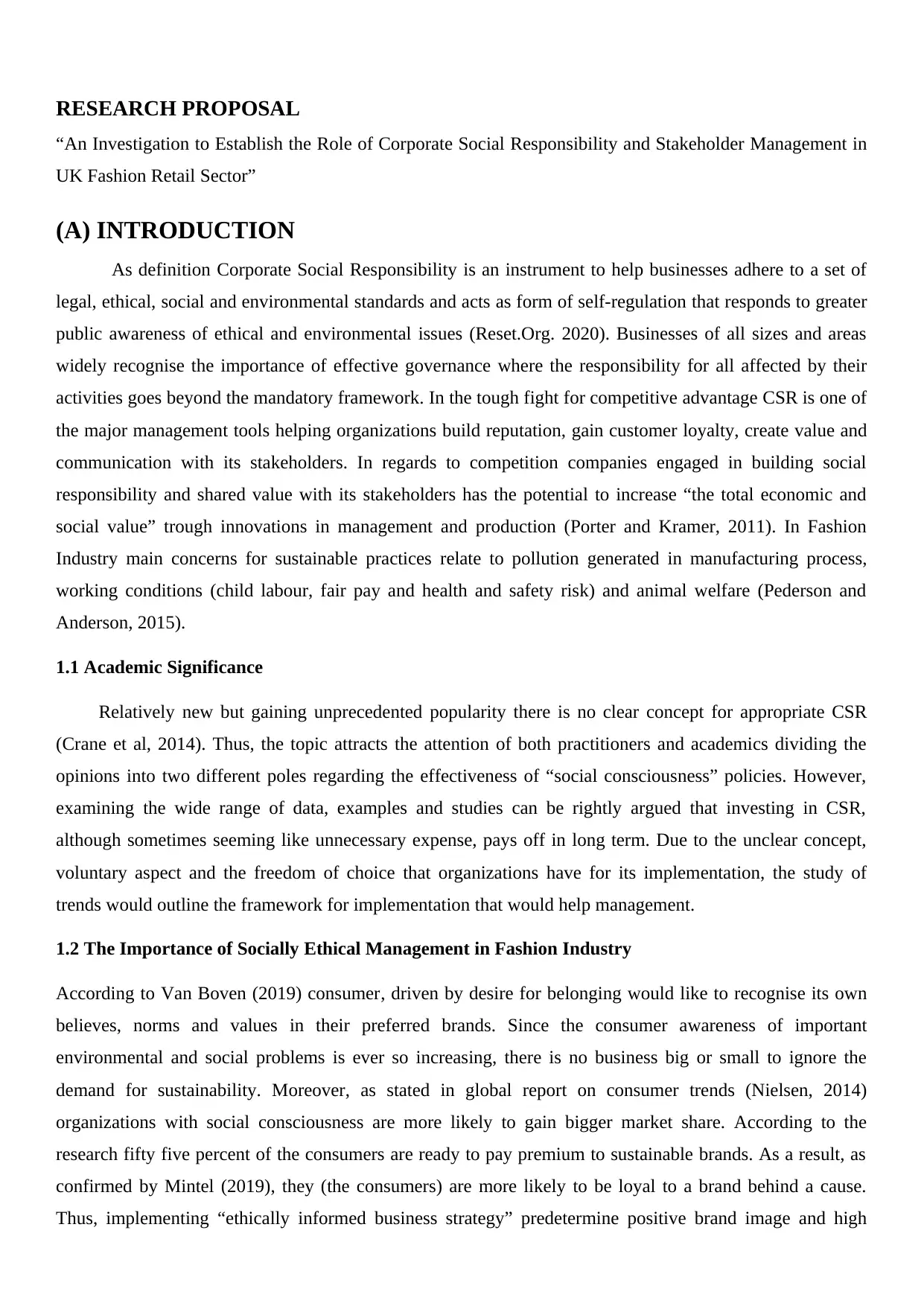
RESEARCH PROPOSAL
“An Investigation to Establish the Role of Corporate Social Responsibility and Stakeholder Management in
UK Fashion Retail Sector”
(A) INTRODUCTION
As definition Corporate Social Responsibility is an instrument to help businesses adhere to a set of
legal, ethical, social and environmental standards and acts as form of self-regulation that responds to greater
public awareness of ethical and environmental issues (Reset.Org. 2020). Businesses of all sizes and areas
widely recognise the importance of effective governance where the responsibility for all affected by their
activities goes beyond the mandatory framework. In the tough fight for competitive advantage CSR is one of
the major management tools helping organizations build reputation, gain customer loyalty, create value and
communication with its stakeholders. In regards to competition companies engaged in building social
responsibility and shared value with its stakeholders has the potential to increase “the total economic and
social value” trough innovations in management and production (Porter and Kramer, 2011). In Fashion
Industry main concerns for sustainable practices relate to pollution generated in manufacturing process,
working conditions (child labour, fair pay and health and safety risk) and animal welfare (Pederson and
Anderson, 2015).
1.1 Academic Significance
Relatively new but gaining unprecedented popularity there is no clear concept for appropriate CSR
(Crane et al, 2014). Thus, the topic attracts the attention of both practitioners and academics dividing the
opinions into two different poles regarding the effectiveness of “social consciousness” policies. However,
examining the wide range of data, examples and studies can be rightly argued that investing in CSR,
although sometimes seeming like unnecessary expense, pays off in long term. Due to the unclear concept,
voluntary aspect and the freedom of choice that organizations have for its implementation, the study of
trends would outline the framework for implementation that would help management.
1.2 The Importance of Socially Ethical Management in Fashion Industry
According to Van Boven (2019) consumer, driven by desire for belonging would like to recognise its own
believes, norms and values in their preferred brands. Since the consumer awareness of important
environmental and social problems is ever so increasing, there is no business big or small to ignore the
demand for sustainability. Moreover, as stated in global report on consumer trends (Nielsen, 2014)
organizations with social consciousness are more likely to gain bigger market share. According to the
research fifty five percent of the consumers are ready to pay premium to sustainable brands. As a result, as
confirmed by Mintel (2019), they (the consumers) are more likely to be loyal to a brand behind a cause.
Thus, implementing “ethically informed business strategy” predetermine positive brand image and high
“An Investigation to Establish the Role of Corporate Social Responsibility and Stakeholder Management in
UK Fashion Retail Sector”
(A) INTRODUCTION
As definition Corporate Social Responsibility is an instrument to help businesses adhere to a set of
legal, ethical, social and environmental standards and acts as form of self-regulation that responds to greater
public awareness of ethical and environmental issues (Reset.Org. 2020). Businesses of all sizes and areas
widely recognise the importance of effective governance where the responsibility for all affected by their
activities goes beyond the mandatory framework. In the tough fight for competitive advantage CSR is one of
the major management tools helping organizations build reputation, gain customer loyalty, create value and
communication with its stakeholders. In regards to competition companies engaged in building social
responsibility and shared value with its stakeholders has the potential to increase “the total economic and
social value” trough innovations in management and production (Porter and Kramer, 2011). In Fashion
Industry main concerns for sustainable practices relate to pollution generated in manufacturing process,
working conditions (child labour, fair pay and health and safety risk) and animal welfare (Pederson and
Anderson, 2015).
1.1 Academic Significance
Relatively new but gaining unprecedented popularity there is no clear concept for appropriate CSR
(Crane et al, 2014). Thus, the topic attracts the attention of both practitioners and academics dividing the
opinions into two different poles regarding the effectiveness of “social consciousness” policies. However,
examining the wide range of data, examples and studies can be rightly argued that investing in CSR,
although sometimes seeming like unnecessary expense, pays off in long term. Due to the unclear concept,
voluntary aspect and the freedom of choice that organizations have for its implementation, the study of
trends would outline the framework for implementation that would help management.
1.2 The Importance of Socially Ethical Management in Fashion Industry
According to Van Boven (2019) consumer, driven by desire for belonging would like to recognise its own
believes, norms and values in their preferred brands. Since the consumer awareness of important
environmental and social problems is ever so increasing, there is no business big or small to ignore the
demand for sustainability. Moreover, as stated in global report on consumer trends (Nielsen, 2014)
organizations with social consciousness are more likely to gain bigger market share. According to the
research fifty five percent of the consumers are ready to pay premium to sustainable brands. As a result, as
confirmed by Mintel (2019), they (the consumers) are more likely to be loyal to a brand behind a cause.
Thus, implementing “ethically informed business strategy” predetermine positive brand image and high
⊘ This is a preview!⊘
Do you want full access?
Subscribe today to unlock all pages.

Trusted by 1+ million students worldwide
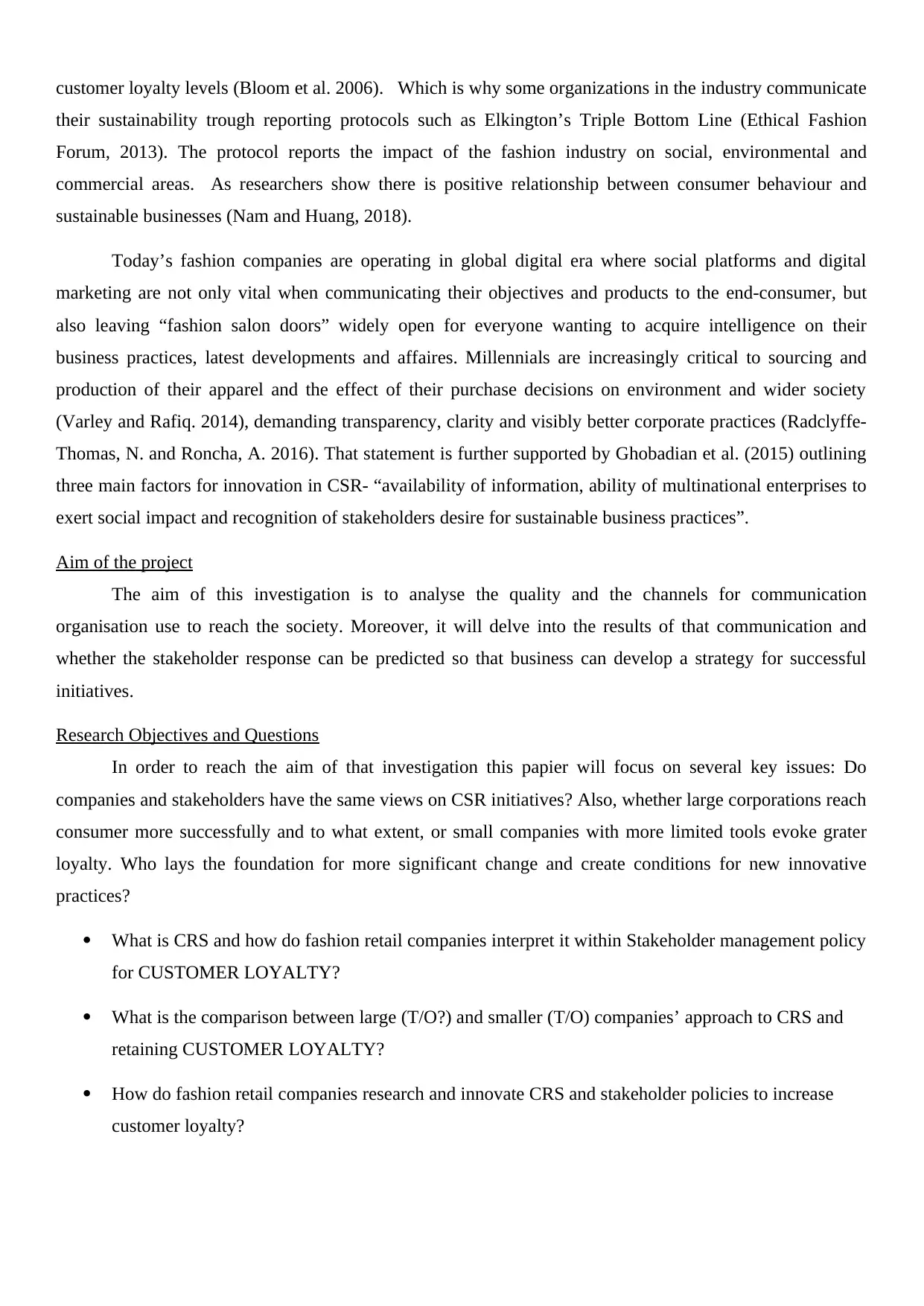
customer loyalty levels (Bloom et al. 2006). Which is why some organizations in the industry communicate
their sustainability trough reporting protocols such as Elkington’s Triple Bottom Line (Ethical Fashion
Forum, 2013). The protocol reports the impact of the fashion industry on social, environmental and
commercial areas. As researchers show there is positive relationship between consumer behaviour and
sustainable businesses (Nam and Huang, 2018).
Today’s fashion companies are operating in global digital era where social platforms and digital
marketing are not only vital when communicating their objectives and products to the end-consumer, but
also leaving “fashion salon doors” widely open for everyone wanting to acquire intelligence on their
business practices, latest developments and affaires. Millennials are increasingly critical to sourcing and
production of their apparel and the effect of their purchase decisions on environment and wider society
(Varley and Rafiq. 2014), demanding transparency, clarity and visibly better corporate practices (Radclyffe-
Thomas, N. and Roncha, A. 2016). That statement is further supported by Ghobadian et al. (2015) outlining
three main factors for innovation in CSR- “availability of information, ability of multinational enterprises to
exert social impact and recognition of stakeholders desire for sustainable business practices”.
Aim of the project
The aim of this investigation is to analyse the quality and the channels for communication
organisation use to reach the society. Moreover, it will delve into the results of that communication and
whether the stakeholder response can be predicted so that business can develop a strategy for successful
initiatives.
Research Objectives and Questions
In order to reach the aim of that investigation this papier will focus on several key issues: Do
companies and stakeholders have the same views on CSR initiatives? Also, whether large corporations reach
consumer more successfully and to what extent, or small companies with more limited tools evoke grater
loyalty. Who lays the foundation for more significant change and create conditions for new innovative
practices?
What is CRS and how do fashion retail companies interpret it within Stakeholder management policy
for CUSTOMER LOYALTY?
What is the comparison between large (T/O?) and smaller (T/O) companies’ approach to CRS and
retaining CUSTOMER LOYALTY?
How do fashion retail companies research and innovate CRS and stakeholder policies to increase
customer loyalty?
their sustainability trough reporting protocols such as Elkington’s Triple Bottom Line (Ethical Fashion
Forum, 2013). The protocol reports the impact of the fashion industry on social, environmental and
commercial areas. As researchers show there is positive relationship between consumer behaviour and
sustainable businesses (Nam and Huang, 2018).
Today’s fashion companies are operating in global digital era where social platforms and digital
marketing are not only vital when communicating their objectives and products to the end-consumer, but
also leaving “fashion salon doors” widely open for everyone wanting to acquire intelligence on their
business practices, latest developments and affaires. Millennials are increasingly critical to sourcing and
production of their apparel and the effect of their purchase decisions on environment and wider society
(Varley and Rafiq. 2014), demanding transparency, clarity and visibly better corporate practices (Radclyffe-
Thomas, N. and Roncha, A. 2016). That statement is further supported by Ghobadian et al. (2015) outlining
three main factors for innovation in CSR- “availability of information, ability of multinational enterprises to
exert social impact and recognition of stakeholders desire for sustainable business practices”.
Aim of the project
The aim of this investigation is to analyse the quality and the channels for communication
organisation use to reach the society. Moreover, it will delve into the results of that communication and
whether the stakeholder response can be predicted so that business can develop a strategy for successful
initiatives.
Research Objectives and Questions
In order to reach the aim of that investigation this papier will focus on several key issues: Do
companies and stakeholders have the same views on CSR initiatives? Also, whether large corporations reach
consumer more successfully and to what extent, or small companies with more limited tools evoke grater
loyalty. Who lays the foundation for more significant change and create conditions for new innovative
practices?
What is CRS and how do fashion retail companies interpret it within Stakeholder management policy
for CUSTOMER LOYALTY?
What is the comparison between large (T/O?) and smaller (T/O) companies’ approach to CRS and
retaining CUSTOMER LOYALTY?
How do fashion retail companies research and innovate CRS and stakeholder policies to increase
customer loyalty?
Paraphrase This Document
Need a fresh take? Get an instant paraphrase of this document with our AI Paraphraser
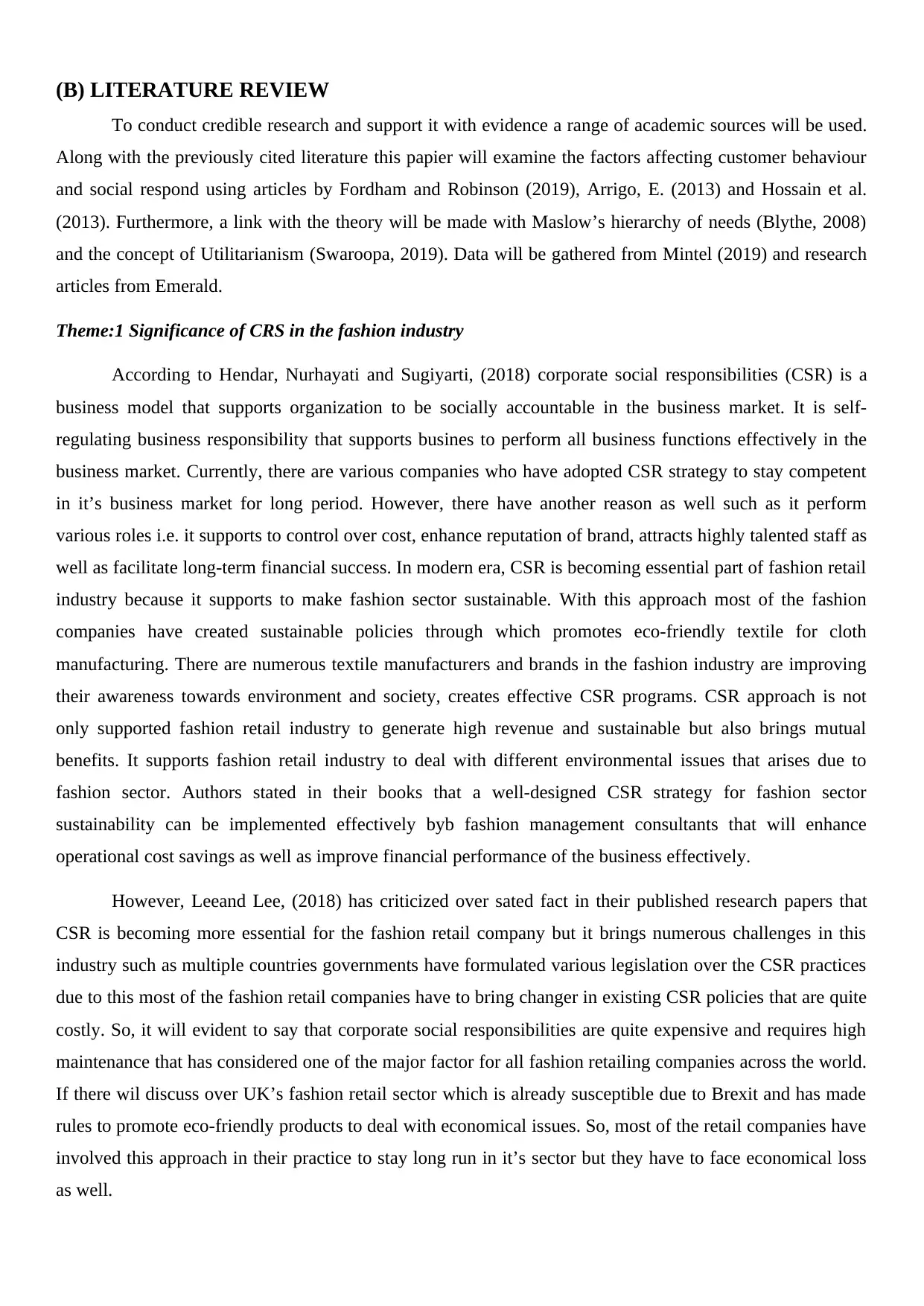
(B) LITERATURE REVIEW
To conduct credible research and support it with evidence a range of academic sources will be used.
Along with the previously cited literature this papier will examine the factors affecting customer behaviour
and social respond using articles by Fordham and Robinson (2019), Arrigo, E. (2013) and Hossain et al.
(2013). Furthermore, a link with the theory will be made with Maslow’s hierarchy of needs (Blythe, 2008)
and the concept of Utilitarianism (Swaroopa, 2019). Data will be gathered from Mintel (2019) and research
articles from Emerald.
Theme:1 Significance of CRS in the fashion industry
According to Hendar, Nurhayati and Sugiyarti, (2018) corporate social responsibilities (CSR) is a
business model that supports organization to be socially accountable in the business market. It is self-
regulating business responsibility that supports busines to perform all business functions effectively in the
business market. Currently, there are various companies who have adopted CSR strategy to stay competent
in it’s business market for long period. However, there have another reason as well such as it perform
various roles i.e. it supports to control over cost, enhance reputation of brand, attracts highly talented staff as
well as facilitate long-term financial success. In modern era, CSR is becoming essential part of fashion retail
industry because it supports to make fashion sector sustainable. With this approach most of the fashion
companies have created sustainable policies through which promotes eco-friendly textile for cloth
manufacturing. There are numerous textile manufacturers and brands in the fashion industry are improving
their awareness towards environment and society, creates effective CSR programs. CSR approach is not
only supported fashion retail industry to generate high revenue and sustainable but also brings mutual
benefits. It supports fashion retail industry to deal with different environmental issues that arises due to
fashion sector. Authors stated in their books that a well-designed CSR strategy for fashion sector
sustainability can be implemented effectively byb fashion management consultants that will enhance
operational cost savings as well as improve financial performance of the business effectively.
However, Leeand Lee, (2018) has criticized over sated fact in their published research papers that
CSR is becoming more essential for the fashion retail company but it brings numerous challenges in this
industry such as multiple countries governments have formulated various legislation over the CSR practices
due to this most of the fashion retail companies have to bring changer in existing CSR policies that are quite
costly. So, it will evident to say that corporate social responsibilities are quite expensive and requires high
maintenance that has considered one of the major factor for all fashion retailing companies across the world.
If there wil discuss over UK’s fashion retail sector which is already susceptible due to Brexit and has made
rules to promote eco-friendly products to deal with economical issues. So, most of the retail companies have
involved this approach in their practice to stay long run in it’s sector but they have to face economical loss
as well.
To conduct credible research and support it with evidence a range of academic sources will be used.
Along with the previously cited literature this papier will examine the factors affecting customer behaviour
and social respond using articles by Fordham and Robinson (2019), Arrigo, E. (2013) and Hossain et al.
(2013). Furthermore, a link with the theory will be made with Maslow’s hierarchy of needs (Blythe, 2008)
and the concept of Utilitarianism (Swaroopa, 2019). Data will be gathered from Mintel (2019) and research
articles from Emerald.
Theme:1 Significance of CRS in the fashion industry
According to Hendar, Nurhayati and Sugiyarti, (2018) corporate social responsibilities (CSR) is a
business model that supports organization to be socially accountable in the business market. It is self-
regulating business responsibility that supports busines to perform all business functions effectively in the
business market. Currently, there are various companies who have adopted CSR strategy to stay competent
in it’s business market for long period. However, there have another reason as well such as it perform
various roles i.e. it supports to control over cost, enhance reputation of brand, attracts highly talented staff as
well as facilitate long-term financial success. In modern era, CSR is becoming essential part of fashion retail
industry because it supports to make fashion sector sustainable. With this approach most of the fashion
companies have created sustainable policies through which promotes eco-friendly textile for cloth
manufacturing. There are numerous textile manufacturers and brands in the fashion industry are improving
their awareness towards environment and society, creates effective CSR programs. CSR approach is not
only supported fashion retail industry to generate high revenue and sustainable but also brings mutual
benefits. It supports fashion retail industry to deal with different environmental issues that arises due to
fashion sector. Authors stated in their books that a well-designed CSR strategy for fashion sector
sustainability can be implemented effectively byb fashion management consultants that will enhance
operational cost savings as well as improve financial performance of the business effectively.
However, Leeand Lee, (2018) has criticized over sated fact in their published research papers that
CSR is becoming more essential for the fashion retail company but it brings numerous challenges in this
industry such as multiple countries governments have formulated various legislation over the CSR practices
due to this most of the fashion retail companies have to bring changer in existing CSR policies that are quite
costly. So, it will evident to say that corporate social responsibilities are quite expensive and requires high
maintenance that has considered one of the major factor for all fashion retailing companies across the world.
If there wil discuss over UK’s fashion retail sector which is already susceptible due to Brexit and has made
rules to promote eco-friendly products to deal with economical issues. So, most of the retail companies have
involved this approach in their practice to stay long run in it’s sector but they have to face economical loss
as well.
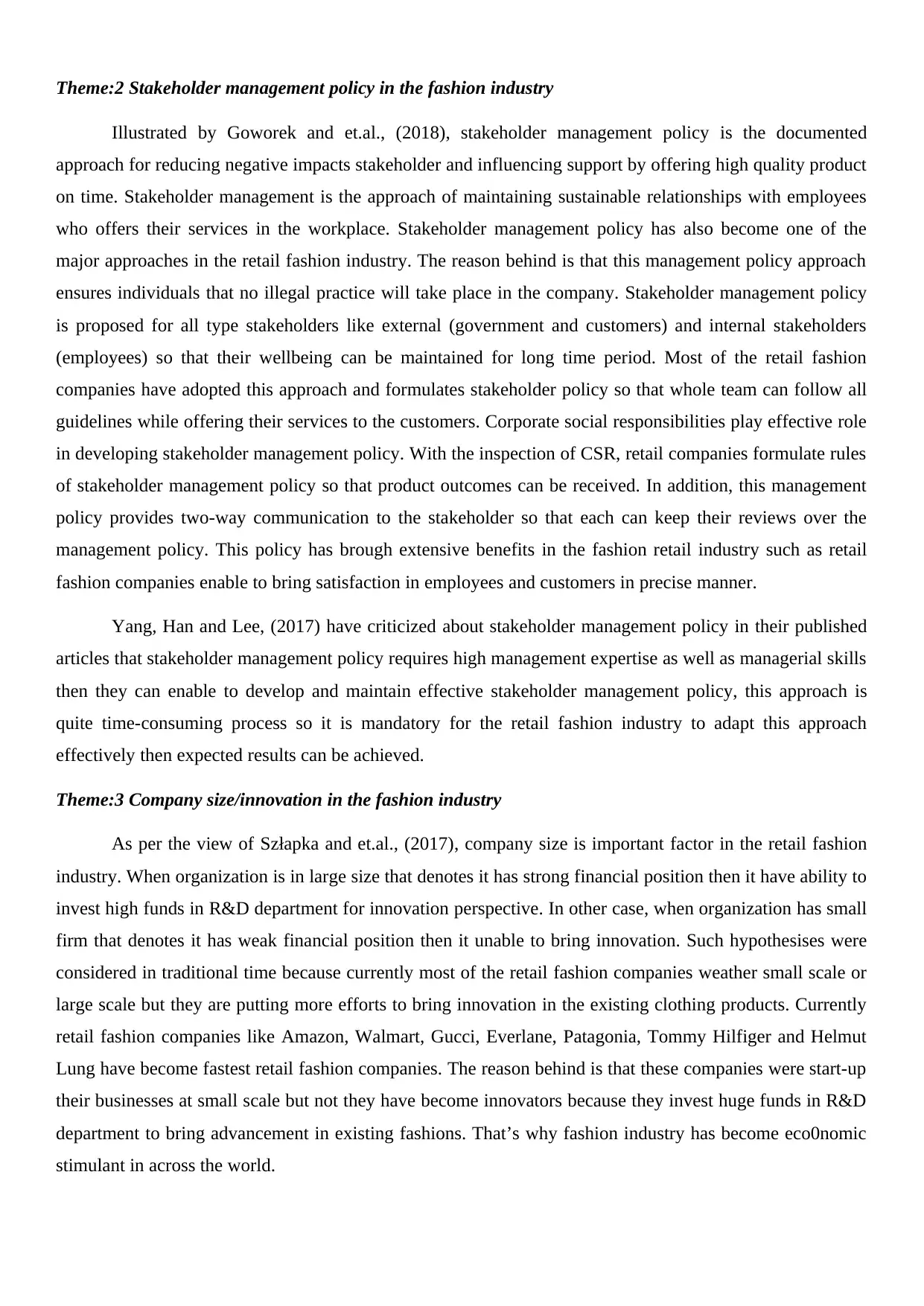
Theme:2 Stakeholder management policy in the fashion industry
Illustrated by Goworek and et.al., (2018), stakeholder management policy is the documented
approach for reducing negative impacts stakeholder and influencing support by offering high quality product
on time. Stakeholder management is the approach of maintaining sustainable relationships with employees
who offers their services in the workplace. Stakeholder management policy has also become one of the
major approaches in the retail fashion industry. The reason behind is that this management policy approach
ensures individuals that no illegal practice will take place in the company. Stakeholder management policy
is proposed for all type stakeholders like external (government and customers) and internal stakeholders
(employees) so that their wellbeing can be maintained for long time period. Most of the retail fashion
companies have adopted this approach and formulates stakeholder policy so that whole team can follow all
guidelines while offering their services to the customers. Corporate social responsibilities play effective role
in developing stakeholder management policy. With the inspection of CSR, retail companies formulate rules
of stakeholder management policy so that product outcomes can be received. In addition, this management
policy provides two-way communication to the stakeholder so that each can keep their reviews over the
management policy. This policy has brough extensive benefits in the fashion retail industry such as retail
fashion companies enable to bring satisfaction in employees and customers in precise manner.
Yang, Han and Lee, (2017) have criticized about stakeholder management policy in their published
articles that stakeholder management policy requires high management expertise as well as managerial skills
then they can enable to develop and maintain effective stakeholder management policy, this approach is
quite time-consuming process so it is mandatory for the retail fashion industry to adapt this approach
effectively then expected results can be achieved.
Theme:3 Company size/innovation in the fashion industry
As per the view of Szłapka and et.al., (2017), company size is important factor in the retail fashion
industry. When organization is in large size that denotes it has strong financial position then it have ability to
invest high funds in R&D department for innovation perspective. In other case, when organization has small
firm that denotes it has weak financial position then it unable to bring innovation. Such hypothesises were
considered in traditional time because currently most of the retail fashion companies weather small scale or
large scale but they are putting more efforts to bring innovation in the existing clothing products. Currently
retail fashion companies like Amazon, Walmart, Gucci, Everlane, Patagonia, Tommy Hilfiger and Helmut
Lung have become fastest retail fashion companies. The reason behind is that these companies were start-up
their businesses at small scale but not they have become innovators because they invest huge funds in R&D
department to bring advancement in existing fashions. That’s why fashion industry has become eco0nomic
stimulant in across the world.
Illustrated by Goworek and et.al., (2018), stakeholder management policy is the documented
approach for reducing negative impacts stakeholder and influencing support by offering high quality product
on time. Stakeholder management is the approach of maintaining sustainable relationships with employees
who offers their services in the workplace. Stakeholder management policy has also become one of the
major approaches in the retail fashion industry. The reason behind is that this management policy approach
ensures individuals that no illegal practice will take place in the company. Stakeholder management policy
is proposed for all type stakeholders like external (government and customers) and internal stakeholders
(employees) so that their wellbeing can be maintained for long time period. Most of the retail fashion
companies have adopted this approach and formulates stakeholder policy so that whole team can follow all
guidelines while offering their services to the customers. Corporate social responsibilities play effective role
in developing stakeholder management policy. With the inspection of CSR, retail companies formulate rules
of stakeholder management policy so that product outcomes can be received. In addition, this management
policy provides two-way communication to the stakeholder so that each can keep their reviews over the
management policy. This policy has brough extensive benefits in the fashion retail industry such as retail
fashion companies enable to bring satisfaction in employees and customers in precise manner.
Yang, Han and Lee, (2017) have criticized about stakeholder management policy in their published
articles that stakeholder management policy requires high management expertise as well as managerial skills
then they can enable to develop and maintain effective stakeholder management policy, this approach is
quite time-consuming process so it is mandatory for the retail fashion industry to adapt this approach
effectively then expected results can be achieved.
Theme:3 Company size/innovation in the fashion industry
As per the view of Szłapka and et.al., (2017), company size is important factor in the retail fashion
industry. When organization is in large size that denotes it has strong financial position then it have ability to
invest high funds in R&D department for innovation perspective. In other case, when organization has small
firm that denotes it has weak financial position then it unable to bring innovation. Such hypothesises were
considered in traditional time because currently most of the retail fashion companies weather small scale or
large scale but they are putting more efforts to bring innovation in the existing clothing products. Currently
retail fashion companies like Amazon, Walmart, Gucci, Everlane, Patagonia, Tommy Hilfiger and Helmut
Lung have become fastest retail fashion companies. The reason behind is that these companies were start-up
their businesses at small scale but not they have become innovators because they invest huge funds in R&D
department to bring advancement in existing fashions. That’s why fashion industry has become eco0nomic
stimulant in across the world.
⊘ This is a preview!⊘
Do you want full access?
Subscribe today to unlock all pages.

Trusted by 1+ million students worldwide
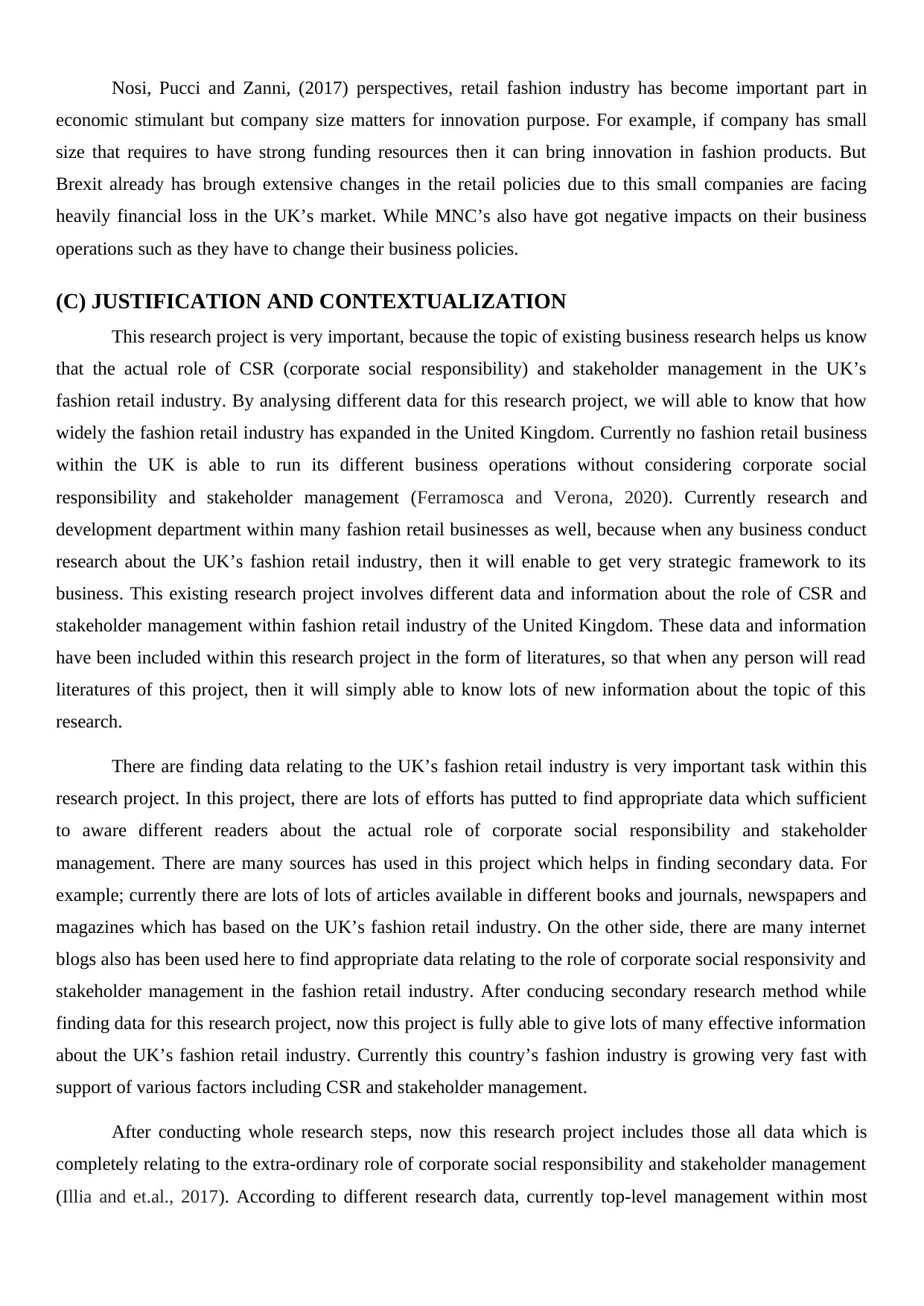
Nosi, Pucci and Zanni, (2017) perspectives, retail fashion industry has become important part in
economic stimulant but company size matters for innovation purpose. For example, if company has small
size that requires to have strong funding resources then it can bring innovation in fashion products. But
Brexit already has brough extensive changes in the retail policies due to this small companies are facing
heavily financial loss in the UK’s market. While MNC’s also have got negative impacts on their business
operations such as they have to change their business policies.
(C) JUSTIFICATION AND CONTEXTUALIZATION
This research project is very important, because the topic of existing business research helps us know
that the actual role of CSR (corporate social responsibility) and stakeholder management in the UK’s
fashion retail industry. By analysing different data for this research project, we will able to know that how
widely the fashion retail industry has expanded in the United Kingdom. Currently no fashion retail business
within the UK is able to run its different business operations without considering corporate social
responsibility and stakeholder management (Ferramosca and Verona, 2020). Currently research and
development department within many fashion retail businesses as well, because when any business conduct
research about the UK’s fashion retail industry, then it will enable to get very strategic framework to its
business. This existing research project involves different data and information about the role of CSR and
stakeholder management within fashion retail industry of the United Kingdom. These data and information
have been included within this research project in the form of literatures, so that when any person will read
literatures of this project, then it will simply able to know lots of new information about the topic of this
research.
There are finding data relating to the UK’s fashion retail industry is very important task within this
research project. In this project, there are lots of efforts has putted to find appropriate data which sufficient
to aware different readers about the actual role of corporate social responsibility and stakeholder
management. There are many sources has used in this project which helps in finding secondary data. For
example; currently there are lots of lots of articles available in different books and journals, newspapers and
magazines which has based on the UK’s fashion retail industry. On the other side, there are many internet
blogs also has been used here to find appropriate data relating to the role of corporate social responsivity and
stakeholder management in the fashion retail industry. After conducing secondary research method while
finding data for this research project, now this project is fully able to give lots of many effective information
about the UK’s fashion retail industry. Currently this country’s fashion industry is growing very fast with
support of various factors including CSR and stakeholder management.
After conducting whole research steps, now this research project includes those all data which is
completely relating to the extra-ordinary role of corporate social responsibility and stakeholder management
(Illia and et.al., 2017). According to different research data, currently top-level management within most
economic stimulant but company size matters for innovation purpose. For example, if company has small
size that requires to have strong funding resources then it can bring innovation in fashion products. But
Brexit already has brough extensive changes in the retail policies due to this small companies are facing
heavily financial loss in the UK’s market. While MNC’s also have got negative impacts on their business
operations such as they have to change their business policies.
(C) JUSTIFICATION AND CONTEXTUALIZATION
This research project is very important, because the topic of existing business research helps us know
that the actual role of CSR (corporate social responsibility) and stakeholder management in the UK’s
fashion retail industry. By analysing different data for this research project, we will able to know that how
widely the fashion retail industry has expanded in the United Kingdom. Currently no fashion retail business
within the UK is able to run its different business operations without considering corporate social
responsibility and stakeholder management (Ferramosca and Verona, 2020). Currently research and
development department within many fashion retail businesses as well, because when any business conduct
research about the UK’s fashion retail industry, then it will enable to get very strategic framework to its
business. This existing research project involves different data and information about the role of CSR and
stakeholder management within fashion retail industry of the United Kingdom. These data and information
have been included within this research project in the form of literatures, so that when any person will read
literatures of this project, then it will simply able to know lots of new information about the topic of this
research.
There are finding data relating to the UK’s fashion retail industry is very important task within this
research project. In this project, there are lots of efforts has putted to find appropriate data which sufficient
to aware different readers about the actual role of corporate social responsibility and stakeholder
management. There are many sources has used in this project which helps in finding secondary data. For
example; currently there are lots of lots of articles available in different books and journals, newspapers and
magazines which has based on the UK’s fashion retail industry. On the other side, there are many internet
blogs also has been used here to find appropriate data relating to the role of corporate social responsivity and
stakeholder management in the fashion retail industry. After conducing secondary research method while
finding data for this research project, now this project is fully able to give lots of many effective information
about the UK’s fashion retail industry. Currently this country’s fashion industry is growing very fast with
support of various factors including CSR and stakeholder management.
After conducting whole research steps, now this research project includes those all data which is
completely relating to the extra-ordinary role of corporate social responsibility and stakeholder management
(Illia and et.al., 2017). According to different research data, currently top-level management within most
Paraphrase This Document
Need a fresh take? Get an instant paraphrase of this document with our AI Paraphraser
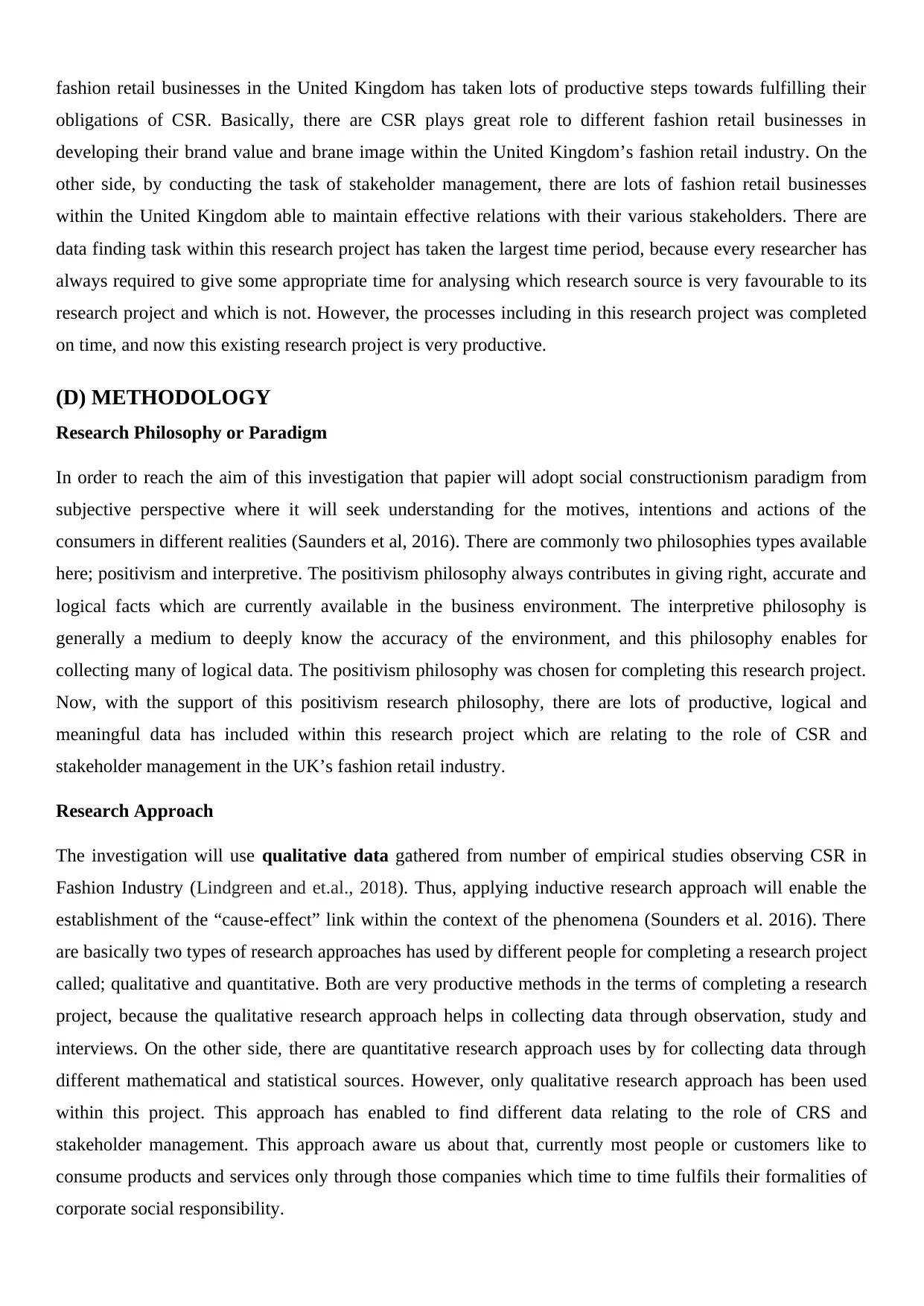
fashion retail businesses in the United Kingdom has taken lots of productive steps towards fulfilling their
obligations of CSR. Basically, there are CSR plays great role to different fashion retail businesses in
developing their brand value and brane image within the United Kingdom’s fashion retail industry. On the
other side, by conducting the task of stakeholder management, there are lots of fashion retail businesses
within the United Kingdom able to maintain effective relations with their various stakeholders. There are
data finding task within this research project has taken the largest time period, because every researcher has
always required to give some appropriate time for analysing which research source is very favourable to its
research project and which is not. However, the processes including in this research project was completed
on time, and now this existing research project is very productive.
(D) METHODOLOGY
Research Philosophy or Paradigm
In order to reach the aim of this investigation that papier will adopt social constructionism paradigm from
subjective perspective where it will seek understanding for the motives, intentions and actions of the
consumers in different realities (Saunders et al, 2016). There are commonly two philosophies types available
here; positivism and interpretive. The positivism philosophy always contributes in giving right, accurate and
logical facts which are currently available in the business environment. The interpretive philosophy is
generally a medium to deeply know the accuracy of the environment, and this philosophy enables for
collecting many of logical data. The positivism philosophy was chosen for completing this research project.
Now, with the support of this positivism research philosophy, there are lots of productive, logical and
meaningful data has included within this research project which are relating to the role of CSR and
stakeholder management in the UK’s fashion retail industry.
Research Approach
The investigation will use qualitative data gathered from number of empirical studies observing CSR in
Fashion Industry (Lindgreen and et.al., 2018). Thus, applying inductive research approach will enable the
establishment of the “cause-effect” link within the context of the phenomena (Sounders et al. 2016). There
are basically two types of research approaches has used by different people for completing a research project
called; qualitative and quantitative. Both are very productive methods in the terms of completing a research
project, because the qualitative research approach helps in collecting data through observation, study and
interviews. On the other side, there are quantitative research approach uses by for collecting data through
different mathematical and statistical sources. However, only qualitative research approach has been used
within this project. This approach has enabled to find different data relating to the role of CRS and
stakeholder management. This approach aware us about that, currently most people or customers like to
consume products and services only through those companies which time to time fulfils their formalities of
corporate social responsibility.
obligations of CSR. Basically, there are CSR plays great role to different fashion retail businesses in
developing their brand value and brane image within the United Kingdom’s fashion retail industry. On the
other side, by conducting the task of stakeholder management, there are lots of fashion retail businesses
within the United Kingdom able to maintain effective relations with their various stakeholders. There are
data finding task within this research project has taken the largest time period, because every researcher has
always required to give some appropriate time for analysing which research source is very favourable to its
research project and which is not. However, the processes including in this research project was completed
on time, and now this existing research project is very productive.
(D) METHODOLOGY
Research Philosophy or Paradigm
In order to reach the aim of this investigation that papier will adopt social constructionism paradigm from
subjective perspective where it will seek understanding for the motives, intentions and actions of the
consumers in different realities (Saunders et al, 2016). There are commonly two philosophies types available
here; positivism and interpretive. The positivism philosophy always contributes in giving right, accurate and
logical facts which are currently available in the business environment. The interpretive philosophy is
generally a medium to deeply know the accuracy of the environment, and this philosophy enables for
collecting many of logical data. The positivism philosophy was chosen for completing this research project.
Now, with the support of this positivism research philosophy, there are lots of productive, logical and
meaningful data has included within this research project which are relating to the role of CSR and
stakeholder management in the UK’s fashion retail industry.
Research Approach
The investigation will use qualitative data gathered from number of empirical studies observing CSR in
Fashion Industry (Lindgreen and et.al., 2018). Thus, applying inductive research approach will enable the
establishment of the “cause-effect” link within the context of the phenomena (Sounders et al. 2016). There
are basically two types of research approaches has used by different people for completing a research project
called; qualitative and quantitative. Both are very productive methods in the terms of completing a research
project, because the qualitative research approach helps in collecting data through observation, study and
interviews. On the other side, there are quantitative research approach uses by for collecting data through
different mathematical and statistical sources. However, only qualitative research approach has been used
within this project. This approach has enabled to find different data relating to the role of CRS and
stakeholder management. This approach aware us about that, currently most people or customers like to
consume products and services only through those companies which time to time fulfils their formalities of
corporate social responsibility.
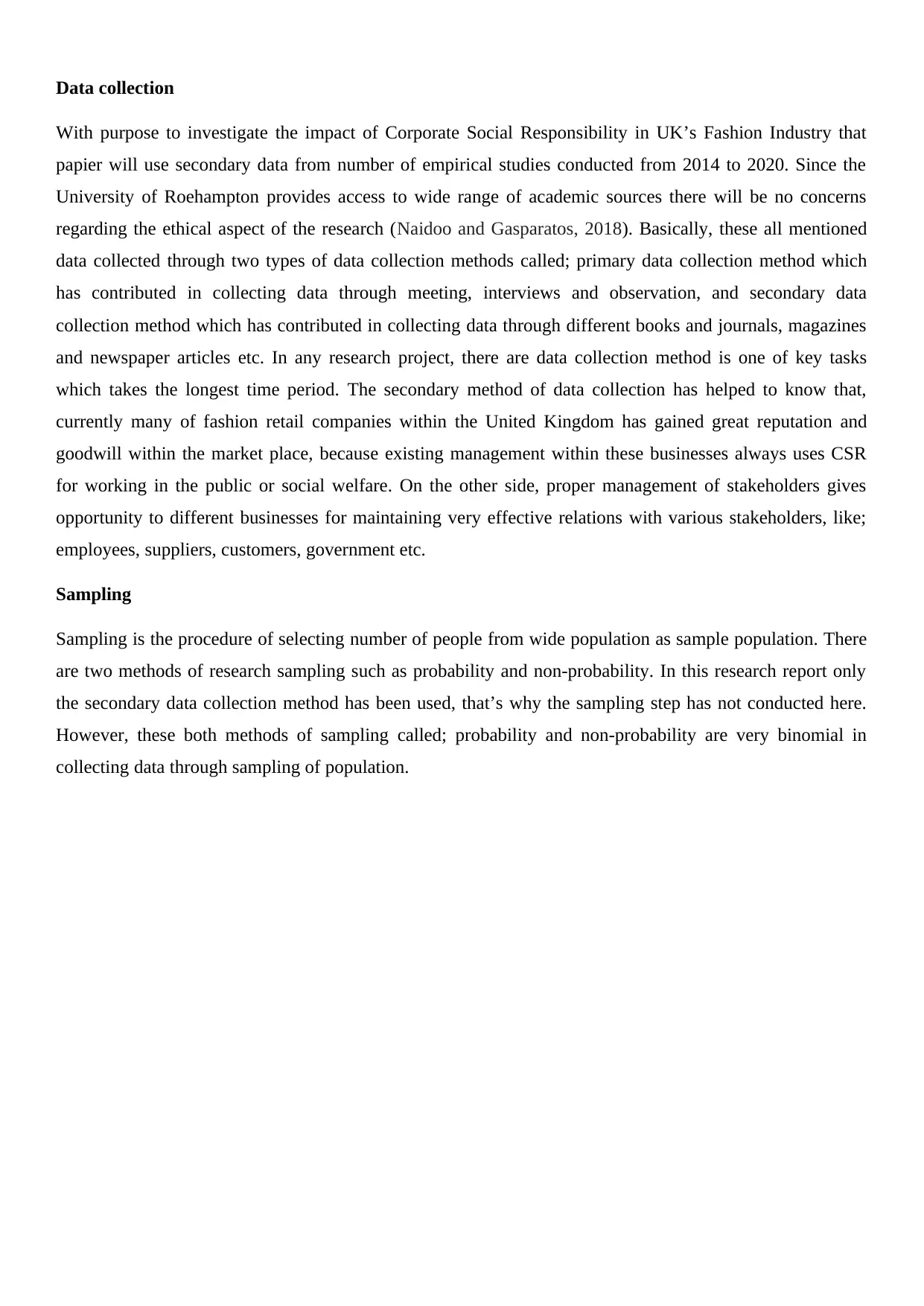
Data collection
With purpose to investigate the impact of Corporate Social Responsibility in UK’s Fashion Industry that
papier will use secondary data from number of empirical studies conducted from 2014 to 2020. Since the
University of Roehampton provides access to wide range of academic sources there will be no concerns
regarding the ethical aspect of the research (Naidoo and Gasparatos, 2018). Basically, these all mentioned
data collected through two types of data collection methods called; primary data collection method which
has contributed in collecting data through meeting, interviews and observation, and secondary data
collection method which has contributed in collecting data through different books and journals, magazines
and newspaper articles etc. In any research project, there are data collection method is one of key tasks
which takes the longest time period. The secondary method of data collection has helped to know that,
currently many of fashion retail companies within the United Kingdom has gained great reputation and
goodwill within the market place, because existing management within these businesses always uses CSR
for working in the public or social welfare. On the other side, proper management of stakeholders gives
opportunity to different businesses for maintaining very effective relations with various stakeholders, like;
employees, suppliers, customers, government etc.
Sampling
Sampling is the procedure of selecting number of people from wide population as sample population. There
are two methods of research sampling such as probability and non-probability. In this research report only
the secondary data collection method has been used, that’s why the sampling step has not conducted here.
However, these both methods of sampling called; probability and non-probability are very binomial in
collecting data through sampling of population.
With purpose to investigate the impact of Corporate Social Responsibility in UK’s Fashion Industry that
papier will use secondary data from number of empirical studies conducted from 2014 to 2020. Since the
University of Roehampton provides access to wide range of academic sources there will be no concerns
regarding the ethical aspect of the research (Naidoo and Gasparatos, 2018). Basically, these all mentioned
data collected through two types of data collection methods called; primary data collection method which
has contributed in collecting data through meeting, interviews and observation, and secondary data
collection method which has contributed in collecting data through different books and journals, magazines
and newspaper articles etc. In any research project, there are data collection method is one of key tasks
which takes the longest time period. The secondary method of data collection has helped to know that,
currently many of fashion retail companies within the United Kingdom has gained great reputation and
goodwill within the market place, because existing management within these businesses always uses CSR
for working in the public or social welfare. On the other side, proper management of stakeholders gives
opportunity to different businesses for maintaining very effective relations with various stakeholders, like;
employees, suppliers, customers, government etc.
Sampling
Sampling is the procedure of selecting number of people from wide population as sample population. There
are two methods of research sampling such as probability and non-probability. In this research report only
the secondary data collection method has been used, that’s why the sampling step has not conducted here.
However, these both methods of sampling called; probability and non-probability are very binomial in
collecting data through sampling of population.
⊘ This is a preview!⊘
Do you want full access?
Subscribe today to unlock all pages.

Trusted by 1+ million students worldwide
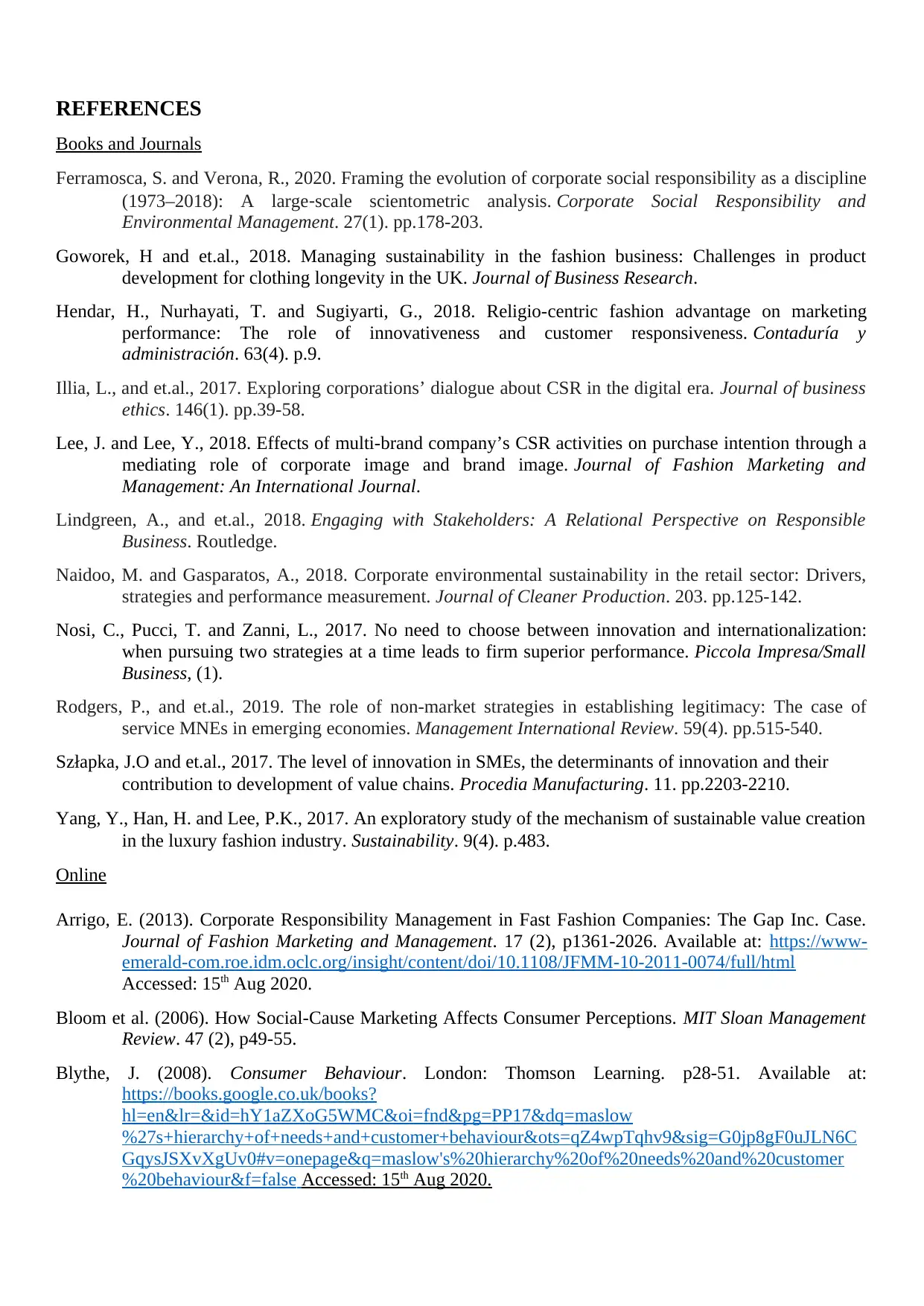
REFERENCES
Books and Journals
Ferramosca, S. and Verona, R., 2020. Framing the evolution of corporate social responsibility as a discipline
(1973–2018): A large‐scale scientometric analysis. Corporate Social Responsibility and
Environmental Management. 27(1). pp.178-203.
Goworek, H and et.al., 2018. Managing sustainability in the fashion business: Challenges in product
development for clothing longevity in the UK. Journal of Business Research.
Hendar, H., Nurhayati, T. and Sugiyarti, G., 2018. Religio-centric fashion advantage on marketing
performance: The role of innovativeness and customer responsiveness. Contaduría y
administración. 63(4). p.9.
Illia, L., and et.al., 2017. Exploring corporations’ dialogue about CSR in the digital era. Journal of business
ethics. 146(1). pp.39-58.
Lee, J. and Lee, Y., 2018. Effects of multi-brand company’s CSR activities on purchase intention through a
mediating role of corporate image and brand image. Journal of Fashion Marketing and
Management: An International Journal.
Lindgreen, A., and et.al., 2018. Engaging with Stakeholders: A Relational Perspective on Responsible
Business. Routledge.
Naidoo, M. and Gasparatos, A., 2018. Corporate environmental sustainability in the retail sector: Drivers,
strategies and performance measurement. Journal of Cleaner Production. 203. pp.125-142.
Nosi, C., Pucci, T. and Zanni, L., 2017. No need to choose between innovation and internationalization:
when pursuing two strategies at a time leads to firm superior performance. Piccola Impresa/Small
Business, (1).
Rodgers, P., and et.al., 2019. The role of non-market strategies in establishing legitimacy: The case of
service MNEs in emerging economies. Management International Review. 59(4). pp.515-540.
Szłapka, J.O and et.al., 2017. The level of innovation in SMEs, the determinants of innovation and their
contribution to development of value chains. Procedia Manufacturing. 11. pp.2203-2210.
Yang, Y., Han, H. and Lee, P.K., 2017. An exploratory study of the mechanism of sustainable value creation
in the luxury fashion industry. Sustainability. 9(4). p.483.
Online
Arrigo, E. (2013). Corporate Responsibility Management in Fast Fashion Companies: The Gap Inc. Case.
Journal of Fashion Marketing and Management. 17 (2), p1361-2026. Available at: https://www-
emerald-com.roe.idm.oclc.org/insight/content/doi/10.1108/JFMM-10-2011-0074/full/html
Accessed: 15th Aug 2020.
Bloom et al. (2006). How Social-Cause Marketing Affects Consumer Perceptions. MIT Sloan Management
Review. 47 (2), p49-55.
Blythe, J. (2008). Consumer Behaviour. London: Thomson Learning. p28-51. Available at:
https://books.google.co.uk/books?
hl=en&lr=&id=hY1aZXoG5WMC&oi=fnd&pg=PP17&dq=maslow
%27s+hierarchy+of+needs+and+customer+behaviour&ots=qZ4wpTqhv9&sig=G0jp8gF0uJLN6C
GqysJSXvXgUv0#v=onepage&q=maslow's%20hierarchy%20of%20needs%20and%20customer
%20behaviour&f=false Accessed: 15th Aug 2020.
Books and Journals
Ferramosca, S. and Verona, R., 2020. Framing the evolution of corporate social responsibility as a discipline
(1973–2018): A large‐scale scientometric analysis. Corporate Social Responsibility and
Environmental Management. 27(1). pp.178-203.
Goworek, H and et.al., 2018. Managing sustainability in the fashion business: Challenges in product
development for clothing longevity in the UK. Journal of Business Research.
Hendar, H., Nurhayati, T. and Sugiyarti, G., 2018. Religio-centric fashion advantage on marketing
performance: The role of innovativeness and customer responsiveness. Contaduría y
administración. 63(4). p.9.
Illia, L., and et.al., 2017. Exploring corporations’ dialogue about CSR in the digital era. Journal of business
ethics. 146(1). pp.39-58.
Lee, J. and Lee, Y., 2018. Effects of multi-brand company’s CSR activities on purchase intention through a
mediating role of corporate image and brand image. Journal of Fashion Marketing and
Management: An International Journal.
Lindgreen, A., and et.al., 2018. Engaging with Stakeholders: A Relational Perspective on Responsible
Business. Routledge.
Naidoo, M. and Gasparatos, A., 2018. Corporate environmental sustainability in the retail sector: Drivers,
strategies and performance measurement. Journal of Cleaner Production. 203. pp.125-142.
Nosi, C., Pucci, T. and Zanni, L., 2017. No need to choose between innovation and internationalization:
when pursuing two strategies at a time leads to firm superior performance. Piccola Impresa/Small
Business, (1).
Rodgers, P., and et.al., 2019. The role of non-market strategies in establishing legitimacy: The case of
service MNEs in emerging economies. Management International Review. 59(4). pp.515-540.
Szłapka, J.O and et.al., 2017. The level of innovation in SMEs, the determinants of innovation and their
contribution to development of value chains. Procedia Manufacturing. 11. pp.2203-2210.
Yang, Y., Han, H. and Lee, P.K., 2017. An exploratory study of the mechanism of sustainable value creation
in the luxury fashion industry. Sustainability. 9(4). p.483.
Online
Arrigo, E. (2013). Corporate Responsibility Management in Fast Fashion Companies: The Gap Inc. Case.
Journal of Fashion Marketing and Management. 17 (2), p1361-2026. Available at: https://www-
emerald-com.roe.idm.oclc.org/insight/content/doi/10.1108/JFMM-10-2011-0074/full/html
Accessed: 15th Aug 2020.
Bloom et al. (2006). How Social-Cause Marketing Affects Consumer Perceptions. MIT Sloan Management
Review. 47 (2), p49-55.
Blythe, J. (2008). Consumer Behaviour. London: Thomson Learning. p28-51. Available at:
https://books.google.co.uk/books?
hl=en&lr=&id=hY1aZXoG5WMC&oi=fnd&pg=PP17&dq=maslow
%27s+hierarchy+of+needs+and+customer+behaviour&ots=qZ4wpTqhv9&sig=G0jp8gF0uJLN6C
GqysJSXvXgUv0#v=onepage&q=maslow's%20hierarchy%20of%20needs%20and%20customer
%20behaviour&f=false Accessed: 15th Aug 2020.
Paraphrase This Document
Need a fresh take? Get an instant paraphrase of this document with our AI Paraphraser
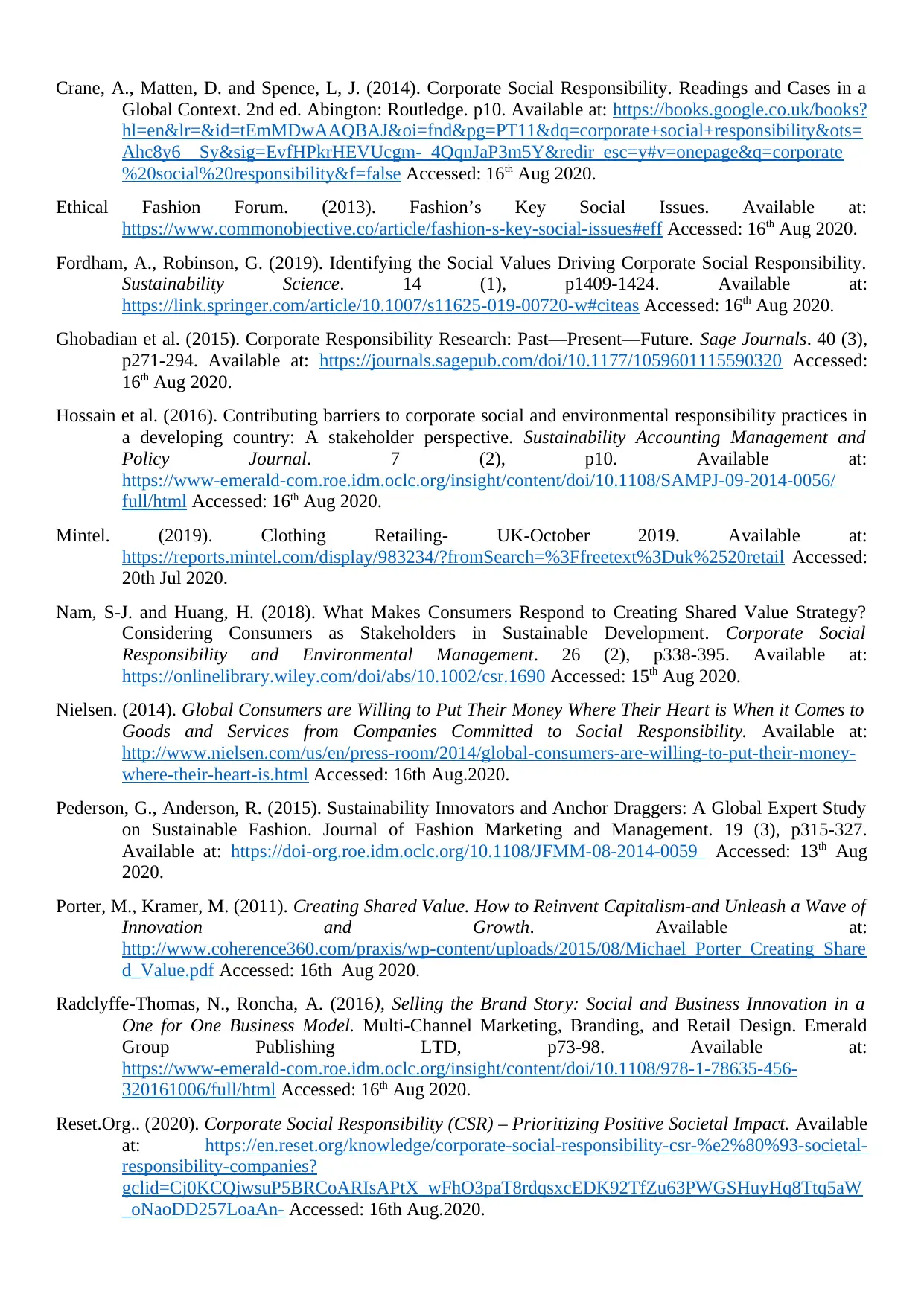
Crane, A., Matten, D. and Spence, L, J. (2014). Corporate Social Responsibility. Readings and Cases in a
Global Context. 2nd ed. Abington: Routledge. p10. Available at: https://books.google.co.uk/books?
hl=en&lr=&id=tEmMDwAAQBAJ&oi=fnd&pg=PT11&dq=corporate+social+responsibility&ots=
Ahc8y6__Sy&sig=EvfHPkrHEVUcgm-_4QqnJaP3m5Y&redir_esc=y#v=onepage&q=corporate
%20social%20responsibility&f=false Accessed: 16th Aug 2020.
Ethical Fashion Forum. (2013). Fashion’s Key Social Issues. Available at:
https://www.commonobjective.co/article/fashion-s-key-social-issues#eff Accessed: 16th Aug 2020.
Fordham, A., Robinson, G. (2019). Identifying the Social Values Driving Corporate Social Responsibility.
Sustainability Science. 14 (1), p1409-1424. Available at:
https://link.springer.com/article/10.1007/s11625-019-00720-w#citeas Accessed: 16th Aug 2020.
Ghobadian et al. (2015). Corporate Responsibility Research: Past—Present—Future. Sage Journals. 40 (3),
p271-294. Available at: https://journals.sagepub.com/doi/10.1177/1059601115590320 Accessed:
16th Aug 2020.
Hossain et al. (2016). Contributing barriers to corporate social and environmental responsibility practices in
a developing country: A stakeholder perspective. Sustainability Accounting Management and
Policy Journal. 7 (2), p10. Available at:
https://www-emerald-com.roe.idm.oclc.org/insight/content/doi/10.1108/SAMPJ-09-2014-0056/
full/html Accessed: 16th Aug 2020.
Mintel. (2019). Clothing Retailing- UK-October 2019. Available at:
https://reports.mintel.com/display/983234/?fromSearch=%3Ffreetext%3Duk%2520retail Accessed:
20th Jul 2020.
Nam, S-J. and Huang, H. (2018). What Makes Consumers Respond to Creating Shared Value Strategy?
Considering Consumers as Stakeholders in Sustainable Development. Corporate Social
Responsibility and Environmental Management. 26 (2), p338-395. Available at:
https://onlinelibrary.wiley.com/doi/abs/10.1002/csr.1690 Accessed: 15th Aug 2020.
Nielsen. (2014). Global Consumers are Willing to Put Their Money Where Their Heart is When it Comes to
Goods and Services from Companies Committed to Social Responsibility. Available at:
http://www.nielsen.com/us/en/press-room/2014/global-consumers-are-willing-to-put-their-money-
where-their-heart-is.html Accessed: 16th Aug.2020.
Pederson, G., Anderson, R. (2015). Sustainability Innovators and Anchor Draggers: A Global Expert Study
on Sustainable Fashion. Journal of Fashion Marketing and Management. 19 (3), p315-327.
Available at: https://doi-org.roe.idm.oclc.org/10.1108/JFMM-08-2014-0059 Accessed: 13th Aug
2020.
Porter, M., Kramer, M. (2011). Creating Shared Value. How to Reinvent Capitalism-and Unleash a Wave of
Innovation and Growth. Available at:
http://www.coherence360.com/praxis/wp-content/uploads/2015/08/Michael_Porter_Creating_Share
d_Value.pdf Accessed: 16th Aug 2020.
Radclyffe-Thomas, N., Roncha, A. (2016), Selling the Brand Story: Social and Business Innovation in a
One for One Business Model. Multi-Channel Marketing, Branding, and Retail Design. Emerald
Group Publishing LTD, p73-98. Available at:
https://www-emerald-com.roe.idm.oclc.org/insight/content/doi/10.1108/978-1-78635-456-
320161006/full/html Accessed: 16th Aug 2020.
Reset.Org.. (2020). Corporate Social Responsibility (CSR) – Prioritizing Positive Societal Impact. Available
at: https://en.reset.org/knowledge/corporate-social-responsibility-csr-%e2%80%93-societal-
responsibility-companies?
gclid=Cj0KCQjwsuP5BRCoARIsAPtX_wFhO3paT8rdqsxcEDK92TfZu63PWGSHuyHq8Ttq5aW
_oNaoDD257LoaAn- Accessed: 16th Aug.2020.
Global Context. 2nd ed. Abington: Routledge. p10. Available at: https://books.google.co.uk/books?
hl=en&lr=&id=tEmMDwAAQBAJ&oi=fnd&pg=PT11&dq=corporate+social+responsibility&ots=
Ahc8y6__Sy&sig=EvfHPkrHEVUcgm-_4QqnJaP3m5Y&redir_esc=y#v=onepage&q=corporate
%20social%20responsibility&f=false Accessed: 16th Aug 2020.
Ethical Fashion Forum. (2013). Fashion’s Key Social Issues. Available at:
https://www.commonobjective.co/article/fashion-s-key-social-issues#eff Accessed: 16th Aug 2020.
Fordham, A., Robinson, G. (2019). Identifying the Social Values Driving Corporate Social Responsibility.
Sustainability Science. 14 (1), p1409-1424. Available at:
https://link.springer.com/article/10.1007/s11625-019-00720-w#citeas Accessed: 16th Aug 2020.
Ghobadian et al. (2015). Corporate Responsibility Research: Past—Present—Future. Sage Journals. 40 (3),
p271-294. Available at: https://journals.sagepub.com/doi/10.1177/1059601115590320 Accessed:
16th Aug 2020.
Hossain et al. (2016). Contributing barriers to corporate social and environmental responsibility practices in
a developing country: A stakeholder perspective. Sustainability Accounting Management and
Policy Journal. 7 (2), p10. Available at:
https://www-emerald-com.roe.idm.oclc.org/insight/content/doi/10.1108/SAMPJ-09-2014-0056/
full/html Accessed: 16th Aug 2020.
Mintel. (2019). Clothing Retailing- UK-October 2019. Available at:
https://reports.mintel.com/display/983234/?fromSearch=%3Ffreetext%3Duk%2520retail Accessed:
20th Jul 2020.
Nam, S-J. and Huang, H. (2018). What Makes Consumers Respond to Creating Shared Value Strategy?
Considering Consumers as Stakeholders in Sustainable Development. Corporate Social
Responsibility and Environmental Management. 26 (2), p338-395. Available at:
https://onlinelibrary.wiley.com/doi/abs/10.1002/csr.1690 Accessed: 15th Aug 2020.
Nielsen. (2014). Global Consumers are Willing to Put Their Money Where Their Heart is When it Comes to
Goods and Services from Companies Committed to Social Responsibility. Available at:
http://www.nielsen.com/us/en/press-room/2014/global-consumers-are-willing-to-put-their-money-
where-their-heart-is.html Accessed: 16th Aug.2020.
Pederson, G., Anderson, R. (2015). Sustainability Innovators and Anchor Draggers: A Global Expert Study
on Sustainable Fashion. Journal of Fashion Marketing and Management. 19 (3), p315-327.
Available at: https://doi-org.roe.idm.oclc.org/10.1108/JFMM-08-2014-0059 Accessed: 13th Aug
2020.
Porter, M., Kramer, M. (2011). Creating Shared Value. How to Reinvent Capitalism-and Unleash a Wave of
Innovation and Growth. Available at:
http://www.coherence360.com/praxis/wp-content/uploads/2015/08/Michael_Porter_Creating_Share
d_Value.pdf Accessed: 16th Aug 2020.
Radclyffe-Thomas, N., Roncha, A. (2016), Selling the Brand Story: Social and Business Innovation in a
One for One Business Model. Multi-Channel Marketing, Branding, and Retail Design. Emerald
Group Publishing LTD, p73-98. Available at:
https://www-emerald-com.roe.idm.oclc.org/insight/content/doi/10.1108/978-1-78635-456-
320161006/full/html Accessed: 16th Aug 2020.
Reset.Org.. (2020). Corporate Social Responsibility (CSR) – Prioritizing Positive Societal Impact. Available
at: https://en.reset.org/knowledge/corporate-social-responsibility-csr-%e2%80%93-societal-
responsibility-companies?
gclid=Cj0KCQjwsuP5BRCoARIsAPtX_wFhO3paT8rdqsxcEDK92TfZu63PWGSHuyHq8Ttq5aW
_oNaoDD257LoaAn- Accessed: 16th Aug.2020.

Saunders et al (2016). Research Methods for Business Students. 7th ed. Harlow: Pearson. p122-218.
Swaroopa, B.P. (2019). Good Values. Great Business. London: Sage. p54-87. Available at:
https://www.vlebooks.com/vleweb/Product/Index/1550027?
Van Boven, B. (2019). Influencing Consumer Attitudes Towards Sustainable Fashion Trough Social
Marketing Campaigns. Available at:
https://pdfs.semanticscholar.org/f851/740f42de28a0724a398cf7ebd21c92a5b7f2.pdf Accessed:
20th Jul 2020.
Varley, R., Rafiq. M. (2014). Principles of Retailing. 2nd ed. London: Red Globe Press. p57. Available at:
https://books.google.co.uk/books?
id=8EgdBQAAQBAJ&printsec=frontcover&source=gbs_ge_summary_r&cad=0#v=onepage&q&f
=false Accessed: 16th Aug 2020.
Swaroopa, B.P. (2019). Good Values. Great Business. London: Sage. p54-87. Available at:
https://www.vlebooks.com/vleweb/Product/Index/1550027?
Van Boven, B. (2019). Influencing Consumer Attitudes Towards Sustainable Fashion Trough Social
Marketing Campaigns. Available at:
https://pdfs.semanticscholar.org/f851/740f42de28a0724a398cf7ebd21c92a5b7f2.pdf Accessed:
20th Jul 2020.
Varley, R., Rafiq. M. (2014). Principles of Retailing. 2nd ed. London: Red Globe Press. p57. Available at:
https://books.google.co.uk/books?
id=8EgdBQAAQBAJ&printsec=frontcover&source=gbs_ge_summary_r&cad=0#v=onepage&q&f
=false Accessed: 16th Aug 2020.
⊘ This is a preview!⊘
Do you want full access?
Subscribe today to unlock all pages.

Trusted by 1+ million students worldwide
1 out of 12
Related Documents
Your All-in-One AI-Powered Toolkit for Academic Success.
+13062052269
info@desklib.com
Available 24*7 on WhatsApp / Email
![[object Object]](/_next/static/media/star-bottom.7253800d.svg)
Unlock your academic potential
Copyright © 2020–2026 A2Z Services. All Rights Reserved. Developed and managed by ZUCOL.





